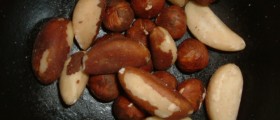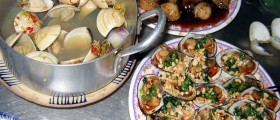
Cashews are one of everyone’s favorite nuts. They are not only delicious, but also very nutritious and highly recommended for daily consumption.
About cashews
Cashew is a tree belonging to the family of Anacardiaceae. Its English name derives from the Portuguese word caju, which indicates the cashew tree. The tree is widely grown for cashew nuts and cashew apples, wherever the climate allows it.
The cashew tree is evergreen and rather small, with spirally arranged elliptic leaves. The fruit, called cashew apple or maranon, is pear-shaped, red or yellow when ripe. The taste is rather sweet and the pulp is juicy, but the skin of this fruit is very delicate which makes the fruit difficult for transportation and storage.
At the end of the cashew apple there is a drupe, shaped like a boxing glove, that contains the nut. However, botanically speaking, cashew is not really a nut but a seed.
The nut has to be roasted before it is fit for human consumption because its double shell that surrounds it contains a poisonous resin called anarcadic acid, which is a strong skin irritant, similar to urushiol in poison ivy.
Cashews should be kept in the refrigerator, where they stay fresh up to six months in a sealed container. However, on room temperature they get spoiled very quickly.
Health benefits of cashews
Cashews are highly praised for their high content of monounsaturated fats, magnesium and copper. A serving of 100 grams of these nuts provides 0.63 milligrams of thiamine, 0.19 milligrams of riboflavin, 2.1 milligrams of niacin, 46 milligrams of calcium, 428 milligrams of phosphorus, 48.2 grams of fat, 27 grams of carbohydrates, 18.5 grams of protein and 578 calories.
The fats in cashews are very beneficial for the human health and they contain no cholesterol. Cashews are a highly energizing food and for that reason they are often found in trail mix snacks and similar products. They make a great breakfast food or a afternoon snack and they are highly praised by athletes and body builders.
Cashews are rich in dietary fiber, which is very important for proper digestion and bowel movement. They also contain high levels of antioxidants.
Because of the high copper content, cashews are beneficial for blood vessels, joints and bones. Magnesium, combined with calcium, is important for proper teeth and bone development, and magnesium is also beneficial for the women in menopause.
Regular consumption of cashews improves the body’s ability to use and absorb iron, it increases energy levels, improves the skin and the hair, protects the bones and connective tissues and keeps the heart and the vascular system strong and healthy.

















Your thoughts on this
Loading...